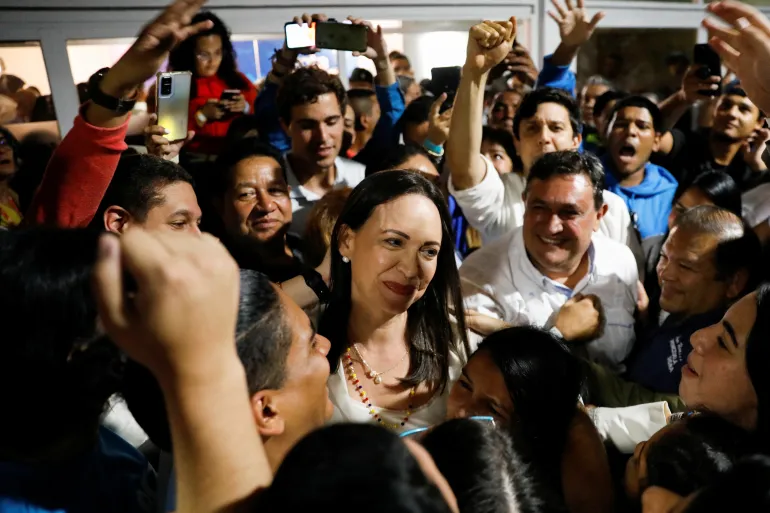
The opposition leader and free market advocate says she has a mandate to take on Maduro.

Former lawmaker Maria Corina Machado has declared victory in the Venezuelan opposition’s presidential primary after taking a decisive lead, potentially putting her in prime position to challenge longtime socialist leader Nicolas Maduro at elections next year.
With more than 26 percent of ballots counted, Machado received a commanding 93 percent share of the vote, the primary’s organising commission said late on Sunday.
“Today, very powerful forces have been unleashed,” Machado told supporters outside her campaign headquarters in the capital, Caracas. “Today I received a mandate and I accept with Venezuelans the commitment of making that mandate matter.”
The count was expected to continue on Monday, but it remains unclear how swiftly it could be completed amid delays that the National Primary Commission blamed on internet censorship.
“We detected that our server that functioned as a transmission channel was blocked, which prevents us from completing this process as scheduled,” said commission head Jesus Maria Casal.
Uncertain challenge
Despite Machado’s clear status as the opposition frontrunner, it is uncertain if the fierce critic of the ruling United Socialist Party will be free to challenge Maduro, who is widely expected to seek another term at elections expected to be held in the second half of 2024.
On June 30, Venezuela’s comptroller general announced Machado would be banned from seeking public office due to her support of international sanctions against Maduro’s government.
There have been indications that the ban might be lifted via negotiations between Venezuela’s opposition and government. The two parties recently signed an election deal, acknowledging each side’s right to nominate candidates based on internal rules. However, this agreement did not nullify pre-existing election prohibitions.
The United States, which broadly eased sanctions on Venezuelan oil and gas and bonds in response to the deal, has said Maduro has until the end of November to begin revoking the bans against the opposition and freeing political prisoners as well as “wrongfully detained” Americans.
While the Maduro government released five prisoners, including prominent opposition members, it reiterated that those with disqualifications will not be able to run in the 2024 race.
The opposition, which maintains that the restrictions are illegal, has not yet outlined what action it will take should Machado remain banned from participation.
Machado has said she could pressure the electoral authorities to let her register, while others have argued a substitute will be necessary if Maduro doubles down.
Third term
Maduro, the protege of former President Hugo Chavez, has been in power since 2013. While he has not formally announced his re-election bid, he is widely expected to seek a third six-year term. A victory would put him on track to stay in office until 2030, far exceeding the 11 years that Chavez held power.

A UN-backed panel said last month that Maduro’s government has intensified efforts to curtail democratic freedoms ahead of the 2024 vote, charges echoed by rights groups. That includes subjecting some politicians and other opponents to detention, surveillance, threats, defamatory campaigns and arbitrary criminal proceedings.


